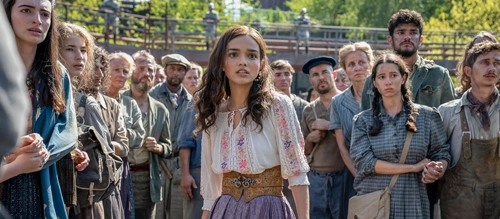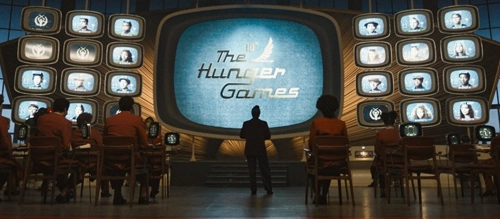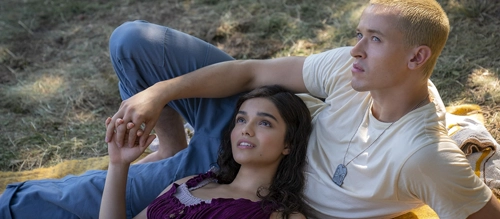The Hunger Games: The Ballad of Songbirds and Snakes (2023) Review

The Hunger Games: The Ballad of Songbirds and Snakes (2023)
Director: Francis: Lawrence
Screenwriter: Michael Lesslie, Michael Arndt
Starring: Tom Blyth, Rachel Zegler, Hunter Schafer, Josh Andres Rivera, Peter Dinklage, Jason Schwartzman, Viola Davis
Everyone loves a good origin story. Whether that origin story is worth telling is a different matter entirely.
When The Hunger Games was released more than a decade ago, its massive success (both with fans and at the box office) opened the floodgates for countless other young adult dystopian adaptations. We got The Mortal Instruments, I Am Number Four, Ender’s Game, Divergent, The Fifth Wave, and The Maze Runner, all of which failed to garner the same praise as The Hunger Games had. Though this trend didn’t make it out of the mid-2010s alive, The Hunger Games series has continued to endure thanks to the quality and consistency of the performances, writing, directing, and production design across all four films. Its themes of war, rebellion, oppression, and the power of love, are more timely than ever.
It was inevitable that Hollywood would eventually circle back to The Hunger Games, especially considering the new trend that has emerged in recent years: nostalgia. In the years since The Hunger Games series ended, Star Wars, Harry Potter, and Ghostbusters have all been resurrected to varying degrees of success, each new entry seemingly struggling to justify its reason to exist. But The Hunger Games: The Ballad of Songbirds and Snakes somehow manages to escape the same fate. Based on the 2020 prequel novel of the same name by “The Hunger Games” author Suzanne Collins, the film stands on its own, reigniting the same spark that made the original films so popular, without ever using those films as a crutch.
In Songbirds and Snakes, we return to the world of Panem 64 years before Katniss Everdeen stepped into the arena. The country is struggling to rebuild following the war, the dark days are barely behind them. The Hunger Games is in its 10th year, but Head Game Maker Dr. Volumnia Gaul (Viola Davis) is struggling to figure out how to get people to keep watching her sickening reality show. Amid this, a young Coriolanus Snow (Tom Blyth), years before he will become the powerful and cruel dictator we know him to be, is desperate to save his family from financial ruin. Though his father helped to create The Hunger Games, his suspicious death left the family penniless. Coriolanus lives in a constant state of possible eviction with his grandma’am (Fionnula Flanagan) and older cousin Tigris (Hunter Schafer), who will go on to become a stylist for the games and later an ally to Katniss in the resistance against The Capitol.
At the academy, Coriolanus is informed that there will be one more test before graduation: seniors must become mentors in the upcoming games. “Your job is to make them into spectacles, not survivors,” Dean Highbottom (Peter Dinklage) tells them. Coriolanus ends up being paired with Lucy Gray Baird (Rachel Zegler), a fiery tribute from District 12 and member of the Covey, a traveling musician troupe. Lucy Gray doesn’t have much in the way of fighting skills, but she is a performer and the arena becomes her stage. She also has a habit of slicing snakes on people that have wronged her. When Coriolanus and Lucy Gray form an unexpected connection, he ends up risking everything to make sure she makes it out of the games alive, but the threat of rebellion in the districts and Coriolanus’ ambition begin to tear them apart.
Songsbirds and Snakes works for a couple of different reasons, chief among them being the fact that almost the entire production team behind The Hunger Games returned to make it. Francis Lawrence, who took over for The Hunger Games director Gary Ross with Catching Fire (2013) and stayed until the end of the series (2015), returned to direct, along with producer Nina Jacobson. Returning production designer Phillip Messina and cinematographer Jo Willem manage to recreate the look of the original series to ensure that it feels as though no time had passed between the final instalment and this prequel, while still giving the film its own visual flair. While The Hunger Games is not tame by any means, the luxury and gloss of The Capitol’s state of the art technology gives everything a glossy sheen. In Songbirds and Snakes, everything is primitive and wild: the arena is a crumbling concrete dome, there is no late night talk show, no fancy training center or tribute living quarters, everything feels rough and unpolished and ten times as dangerous. The color pallet, although reminiscent of the original films, is decidedly darker. The production and costume designers took obvious inspiration from the 1940s, and particularly Nazi Germany, especially in regards to the battle rifles used. While The Hunger Games used analogue technology as a jumping off point for its futuristic designs, Songbirds and Snakes takes that to another level. It’s easy to see how this Panem will eventually becomes that one, decades later. The film is one of those rare big-budget spectacles that actually looks as expensive as it is.

The Hunger Games succeeded in part because the novels were adapted with care, the filmmakers making sure to keep important details and characters and moments that made the story work in the first place. The narrative wasn’t tossed into a blender and then thrown up on screen. Suzanne Collins’ rich world building remained in tact throughout the four original films, and the same goes for Songbirds and Snakes. Every film in the original series is nearly 1 to 1 to its novel counterparts. Fans eager for another faithful adaptation will not be disappointed. Songbirds and Snakes stays almost entirely true to the spirit of the novel.
Despite the pressure of being the first entry in a widely popular franchise in nearly decade, Songbirds and Snakes is not trying to replicate the story beats of The Hunger Games. Suzanne Collins crafted an intriguing origin story for her main villain, and that is partially responsible for this, but the filmmakers can also take credit as they didn’t feel the need to replicate moments from the original series or reference characters and events that haven’t happened yet (in the timeline of their in-film world). The closest they get to a wink and a nod is when Lucy Gray tells Coriolanus that the plant she’s holding is Katniss. Of course, those looking to have a little bit of the original series injected in their veins will not be disappointed either. Composer James Newton Howard knows exactly when to employ his Mockingjay theme. The structure of the film is also different and not just a carbon copy of the previous films, which almost always ended in the arena or in some type of explosive battle. Songbirds and Snakes takes the opposite approach. The first half of the movie is spent preparing for and executing the games, with the latter half dedicated to the unravelling of Coriolanus and Lucy’s relationship. Although, the movie does lose some steam once the games are over.

As far performances go, Songbirds and Snakes has a strong main cast that helps elevate the material and convey the complex inner lives of our characters even when it’s not necessarily found on the page. In addition to an impeccable American accent and a really good blond wig, relatively unknown English actor Tom Blyth manages to step into the shoes previously worn by the prolific Donald Sutherland with ease, although he doesn’t quite have Sutherland’s flair for the dramatic. But he’s just as charismatic to watch, and although he makes the character his own, it is not hard to believe that he is the younger version of a character we already know. He has a similar face and a similar voice, but there’s a hint of humanity in him that he has all but abandoned when we see him in The Hunger Games. In Songbirds and Snakes, there’s a vulnerability to him, but there’s also a darkness lurking just below the surface and Blyth balances that very well. Rachel Zegler is perfectly cast as Lucy Gray, brimming with charm and confidence. It should be no surprise that Zegler has a fantastic voice, thanks to her screen debut as Maria in Steven Spielberg’s West Side Story. Josh Andres Rivera is an absolute scene stealer as Sejanus Plinth, classmate of Coriolanus whose sympathy for the rebel cause becomes his ultimate downfall, and Hunter Schafer, who burst onto the scene as Jules on the HBO series “Euphoria”, is enchanting as Snow’s cousin Tigris, although her talent does feel wasted on such a small part. Jason Schwartzman (Asteroid City) is absolutely hilarious as Lucretius “Lucky” Flickerman, first television host of the games and presumed relative of Caesar Flickerman, who was played by Stanley Tucci in the original. His one liners in the midst of children killing each other highlights just how crass and and out of touch the people in The Capitol are. His performance never feels forced or over the top, as Tucci’s sometimes did.
All in all, Songbirds and Snakes is a worthy entry into The Hunger Games canon, offering a rich and intriguing peek into the past. It’s not as emotionally satisfying as the original series, but with only one film as opposed to four, that’s a difficult height to reach. Still, in an industry overrun with remakes, prequels, sequels, and reboots, Songbirds and Snakes understands how capturing the magic of a series so many already love is easy, you just have to tell a really good story.
Score: 22/24

